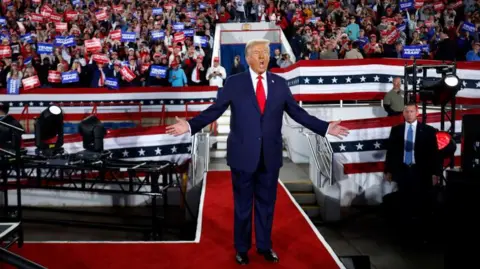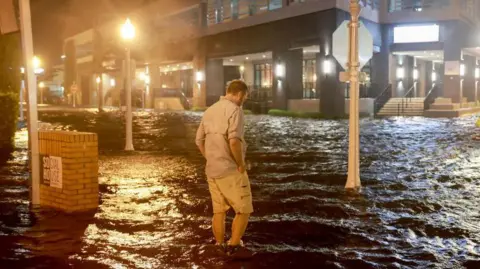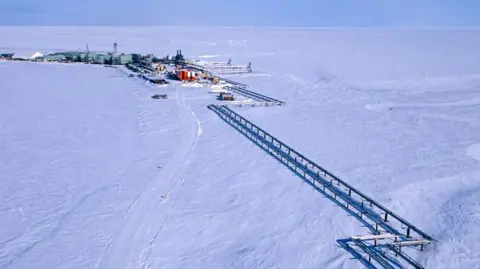Trump victory is a major setback for climate action, experts say
 Getty Images
Getty ImagesDonald Trump's return to the White House will have a hugely negative effect on climate change action in the short-term but the longer term impact is less certain, experts say.
With world leaders meeting next week for the latest UN climate talks, COP29, the Trump victory will be seen as a huge roadblock to progress in both cutting emissions and raising cash for developing countries.
The US president-elect is a known climate sceptic who has called efforts to boost green energy a "scam".
But with renewable energy gaining a strong foothold in the US and popular support for wind and solar, Trump's efforts to ramp up oil and gas instead may be less effective.
 Getty Images
Getty ImagesWhile climate change did not play much of a role in this year's campaign, Trump's likely actions in office this time could be far more significant than in 2017.
Back then, he announced the US would pull out of the Paris climate agreement, the most important UN process to tackle climate change. The agreement saw almost all the world's nations - for the first time - agree to cut the greenhouse gas emissions which cause global warming.
But the shock of Trump's decision was limited. The treaty's rules meant the US was not able to withdraw until November 2020, a few months before he left office.
If Trump withdraws again, he will only have to wait a year before the US is completely out. That would give him three years to chart his own course without any need to report to the UN or be bound by its rules.
While President Joe Biden's negotiators will be at next week's COP talks in Azerbaijan, nothing they agree to will be binding for the Trump administration.
"The US at this COP is not just a lame duck, it's a dead duck," said Prof Richard Klein, an expert on climate change policy for the Stockholm Environment Institute.
"They can't commit to anything and that means that countries like China will not want to commit to anything."
In recent years, richer countries such as the US, UK and EU states have tried to increase the funds available for developing countries to cope with climate change. But they also insist that big developing economies also contribute.
"The US basically wanted to have China cough up some money for that fund as well. Now they won't be able to do that. That leaves China off the hook," Prof Klein said.
Climate scientists say developing countries need billions of dollars of extra investment to become net zero, where they are not contributing to climate change, and stave off the effects of rising temperatures.
 Getty Images
Getty ImagesWhile the US might leave the Paris Agreement quite quickly, Trump would still be bound by other global efforts to fight climate change.
There have been reports that some of his supporters also want to turn their backs on these as well. Some have argued for a complete break from UN efforts on climate change, urging the president-elect to leave something called the UN Framework Convention on Climate Change, the treaty that underpins global collective action to tackle climate change.
This was ratified by the US Senate, almost unanimously, in 1992. Legal experts are unclear on the process of leaving the treaty, but any effort by the US to leave would be seen as a body blow to the principle of multi-lateral action to tackle the world's greatest threat.
As well as these headline-grabbing international actions, the new Trump administration is likely to push for a major ramp up of oil and gas exploration within the US, roll back environmental protections as well as impose heavy tariffs on electric vehicles and solar panels coming from China.
"You are looking at, overall, a 'drill baby drill' philosophy," Dan Eberhart, chief executive officer of oilfield services company Canary LLC told Bloomberg News.
"You are going to see offshore lease sales, you are going to see pipelines move much quicker, you are going to see fracking on federal lands and a mindset that is focused on lowering energy costs for consumers."
There was a big drop in the share price of turbine manufacturers on Wednesday, as fears grew that US offshore wind farms would be cancelled by a Trump presidency.
But in the longer term, it is not clear if the new president will turn back the clock for coal, oil and gas, or curtail the growth of sustainable energy sources.
For a start he faces opposition - and notably from within his own party.
Biden's Inflation Reduction Act, which may ultimately channel $1 trillion of spending into green energy, has been hugely beneficial to Republican districts.
According to one analysis, some 85% of the money has been in areas that elected Republicans.
With energy watchdog the International Energy Agency reporting that global investment in clean technology is running at double the size of coal, oil and gas in 2024, the new US administration might not want to drive this type of green investment into other, more eager countries.
Climate leaders are putting a lot of faith in the fact that the transition to green energy will not be derailed by the new Trump administration.
"The result from this election will be seen as a major blow to global climate action," said Christiana Figueres, the former UN climate chief.
"But it cannot and will not halt the changes under way to decarbonise the economy and meet the goals of the Paris agreement."


Sign up for our Future Earth newsletter to get exclusive insight on the latest climate and environment news from the BBC's Climate Editor Justin Rowlatt, delivered to your inbox every week.
Outside the UK? Sign up to our international newsletter here.
